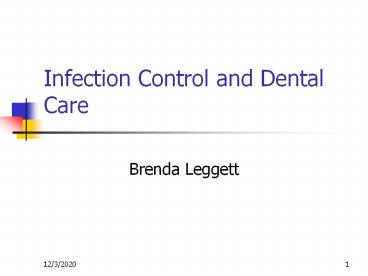Infection Control and Dental Care - PowerPoint PPT Presentation
Title:
Infection Control and Dental Care
Description:
Based on the principle that health histories and examinations may NOT reliably ... Moderate protection gloves recommended- masks, eyewear optional ... – PowerPoint PPT presentation
Number of Views:139
Avg rating:3.0/5.0
Title: Infection Control and Dental Care
1
Infection Control and Dental Care
- Brenda Leggett
2
The Infectious Process
- There are three essential Components
- A susceptible HOST
- A causative AGENT
- A portal of ENTRY
3
Chain of Asepsis
- Therefore by eliminating any ONE of the three
components - An infection cannot occur
4
Significant Concepts
- Universal Precautions
- Risk assessment
5
Universal Precautions
- Are a set of RISK Reduction measures
- Based on the principle that health histories and
examinations may NOT reliably identify disease
carriers - Must be used when exposed to blood contaminated
saliva as well as blood
6
Universal Precautions
- Health care workers should use when encountering
blood or other body fluids Supporting information
and examples - Relates to
- the proper handling of sharps
- The use of barriers as personal protection
7
RISK ASSESSMENT
- Health care workers should evaluate the risk of
infection for each care situation - Blood is the most important transmitter of
disease, so procedures involving contact with
blood need MAXIMUM protection
8
Categories of Risk
Task level Exposure Type Barrier precautions
Surgery, periodontal Care Exposure to blood, or blood contaminated saliva( may involve aerosols) Maximum protection
Examinations, radiographs Involves intact mucosal contact with no anticipated splatter Moderate protection gloves recommended- masks, eyewear optional
Consultations, etc. No exposure to blood or body fluids None required
9
Levels of Disinfection
- High level
- Some, but not all bacterial spores are killed
- Intermediate level
- Kills Mycobacterium tuberculosis
- Low level
- Kills most bacteria, some fungi, and some viruses
- NOT SUITABLE for dental instruments or surfaces
10
Recommended decontamination
Categort of object Definition Type of decontamination
Critical Instruments that penetrate oral tissues e.g scalers Sterilization is required due to exposure to blood
Semi-critical Instruments that contact intact mucous membranes e.g. air/water tips Sterilization if possible. If susceptible to heat damage use high level disinfection
Non-critical Equipment with no exposure to blood e.g. mixing slabs Intermediate level disinfection
11
Use of Barriers
- As an alternative to INTERMEDIATE level
disinfection, barrier surfaces such as - Light handles
- X-ray units
- Chair buttons
- Saves time, protects against damage from
disinfectants
12
Reducing Contamination
- Remove unecessary items from counter tops
- Use overgloves when maintaining clinical records
- Use transfer forceps to access additional
supplies or instruments
13
Reducing Contamination
- Use disposable items
- Minimize aerosols by
- Use of rubber dam
- Have client use pre-op rinse
- Use high volume suction
- Proper handling of sharps and contaminated waste
14
The End







![[PDF] Infection Control and Management of Hazardous Materials for the Dental Team, 6e 6th Edition Kindle PowerPoint PPT Presentation](https://s3.amazonaws.com/images.powershow.com/10077071.th0.jpg?_=20240711012)













![[PDF] Essentials of Dental Radiography and Radiology Kindle PowerPoint PPT Presentation](https://s3.amazonaws.com/images.powershow.com/10079930.th0.jpg?_=20240717028)




![[PDF] Student Workbook for Modern Dental Assisting 12th Edition Free PowerPoint PPT Presentation](https://s3.amazonaws.com/images.powershow.com/10101138.th0.jpg?_=20240816096)




